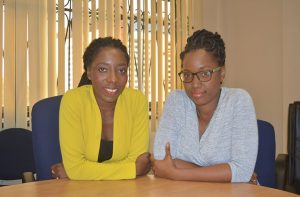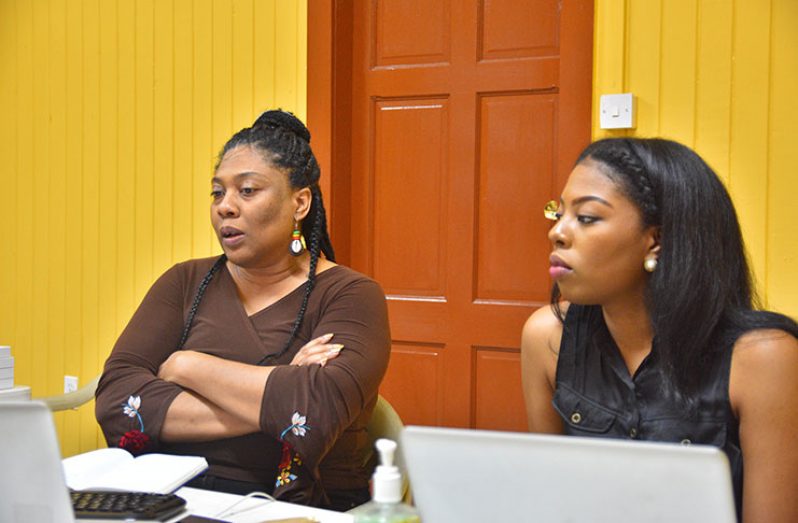-Underrepresentation of women and girls in science must change
ON Sunday nations around the world celebrated ‘International Day of Women and Girls in Science’ with topics such as gender equality rising to the forefront of the conversation.
According to data, less than 30 per cent of the world’s researchers are women who continue to be deterred from pursuing careers in science, technology, engineering and mathematics (STEM).
To shed light on the issues faced locally, the Guyana Chronicle made contact with a few women and organisations, such as co-founders of STEM Guyana, Karen Abrams and Ima Christian, both of whom are of the view that although Guyana has progressed, much more room remains for improvement.
According to Abrams, the underrepresentation of females in the fields of science and technology experienced locally is a fundamental issue that can impact Guyana’s development if not properly addressed. “In terms of Guyana, 50 per cent of the population is women. The vast majority of new jobs in the future will be technology jobs and so, if you lock out 50 per cent of the population from engaging and participating in those jobs, you’re essentially reducing the productivity workforce,” she said.
“You’re actually slowing down the development of your country if you don’t have all of the minds who can be engaged, working on solutions, solving problems and working in the industry,” Abrams added.
Meanwhile, Christian, a Computer Science student at Stanford University in California, recalled some of her experiences whereby her insight was completely overlooked during class activities, and which caused her to think more on the matter.

“I have been in situations where the guy that I’ve been partnered with, in my section, would just take the pencil, take the paper and start writing out his logic without even consulting me…or would raise their hands and said what they thought without asking me what were my thoughts or how would I approach this issue,” the young woman recounted. These are only some of the encounters that she says have helped to solidify her resolve for encouraging young girls to be determined to continue to excel in the field nonetheless.
Abrams, who has worked in technology for several years, says although similar experiences have made her into a fighter, this is not how it should have to be for women and girls around the world. “It made me had to fight, fight, fight all the time. I was willing to do that because I had sort of been trained that way but you shouldn’t have to do that,” she said, adding: “At the very early stages, parents have to intervene and they have to stop making differentiations between boys work and girls work…all those things are counter-productive…they stymie kids and impact them mentally and it disadvantages them as they progress later.”
At the same time, Christian said that girls ought not to be afraid of failure as it was a necessary ‘rite of passage’ in the pursuance of success.
“We often teach girls that if they fail at something the first time, that’s probably just not for them…when really, these fields are about failing until you get it,” Christian said.
“Instead of viewing it as, ‘she’s not getting it, therefore, this isn’t for her’, we want to help push girls into thinking this is just part of learning. [To think]: ‘This failure that I’m experiencing right now does not define my career or the trajectory of my life or what I am or am not good at,’” she encouraged.
Science transcends numerous boundaries and helped countries address a number of inter-connected global challenges. One of these, crucial to the achievement of criminal justice, is the study of forensic science. Two young females employed at the Guyana Forensic Science Laboratory (GFSL), Forensic Toxicologist, Tomica Bacchus and Forensic Chemist, Charis Griffith told this newspaper that both girls and boys have the potential to pursue their ambitions in science.
“Everyday things are changing, the world is evolving, science and technology is advancing so the more young people we have pursuing science then it would be better for Guyana and for the region,” Bacchus said.
Her colleague, Griffith added that she is pleased to witness Guyana’s gradual improvement as women are being empowered to be involved despite existing stereotypes.
“Guyana is moving past that [stereotypes] because I’ve had some male friends who were saying that ‘the woman’s place is in the kitchen’ but then I’ve also had female friends who have been pursuing [scientific careers], becoming doctors saying that their place is not the kitchen alone, they can do other things,” Griffith said, further encouraging: “So, as a woman you can do whatever you want to do, just know what it is you want and go after it.”
Bacchus, who initially studied Laboratory Science in the hope of saving lives, later developed a passion for forensics to help out in the judicial system where she says many persons may be jailed wrongfully, be it not for this field of science.
She then petitioned for the necessary authorities to pay more attention to local scientists and to place additional spotlight on positive role models in the field, so that more women can be motivated to excel.
“We need to encourage each other and have a lot more educational speeches whereby we can encourage young girls or women to reach their full potential…we need the ones above us to push more for us or to listen to our voices as young scientists… support us, allow us to show and execute our skills and the knowledge that we would have gained,” she implored.
At the same time, Griffith, who studied Chemistry at the University of Guyana, calls on the government to continue allotting scholarship programmes to the field, as it continues to help women like her to pursue their dreams.
“They [the government] should continue on their scholarship paths because I received a scholarship from the government…I wanted to be a part of that group of people that are normally behind the scenes like Forensic Scientists. They actually help individuals who may have lost their voice or those who are wrongfully jailed.”



.jpg)










